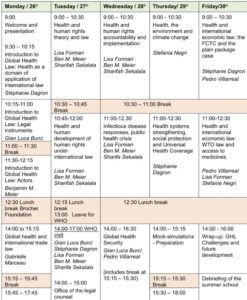Introduction :

The first edition of the Summer School in Global Health Law was held from June 26th to
30th, 2023 at the Fondation Brocher. The course reunited master’s and doctoral students as
well as professionals from around the world – 26 countries were represented in this first
edition. The participants had varied backgrounds, such as law, political science, policy,
medicine, public health, and had specific interests in learning more about global health norms
and strategies.
The course provided an advanced overview of global health law. The approach was guided by
the in-depth examination of specific global health challenges and the analysis provided by
scholars as well as by practitioners involved in the resolution of these issues. More
specifically, courses focused on the concept of global health; the norms and actors of
international health law; issues at the frontier between health and international human rights
law, economic law, environmental law, social protection law and global health governance.
Special attention was given to the WHO pandemic instrument that is currently being
negotiated and that was in negotiation in summer 2023 at the time of the summer school.
Students learned through a combination of lectures, seminars, class discussions, practical
exercises, and a field visit to WHO (including meetings with WHO experts from diverse
departments).
The Summer School is affiliated to the University of Geneva and the Geneva Summer
Schools office helped organize the event. The course was directed by Prof. Stéphanie Dagron,
who is a Faculty member of both the law and the medical Faculties of the University of
Geneva, with the support of an international scientific committee composed of the following
professors: Prof. Gian Luca Burci (Graduate Institute, Geneva, Switzerland), Prof. Lisa
Forman (Toronto University, Canada), Prof. Benjamin Mason Meier (University of North
Carolina at Chapel Hill, USA) and Dr. Pedro Villarreal (Max-Planck-Institute, Germany).
Prof. Stefania Negri (University of Salerno, Italy), Prof. Sharifah Sekalala (University of
Warwick, UK) and Prof. Gabrielle Marceau (University of Geneva and WTO, Switzerland)
also joined the programme.


